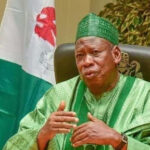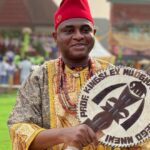Barrister Kaloma Dahiru Mustapha is a former Special Adviser on Intergovernmental Affairs to Jigawa State governor. The son of late ex-Chief Justice of Nigeria (CJN), Justice Dahiru Mustapha, who is seeking to represent Babura/Garki Federal Constituency at the National Assembly on the platform of Social Democratic Party (SDP), he speaks on his vision and other topical issues. Excerpt:
You’re transitioning from a very impressive background in law to politics. What is the reason for that significant movement?
Nigerians have chosen for themselves a multi-party democratic system as the means to actualise their aspirations. It is a serious challenge being posed to the Nigerian state and citizens to find people who understand the country’s developmental woes. I have mentioned to some friends that if I were from the South-West, I don’t think I would have gone into politics; the reason being the way the society is structured.
There are so many ways you can contribute effectively to the society without being part of the political system. But it is completely different in the North. The dominance of the public sector in almost everything that we do makes it very paramount that we need to be very careful of the quality of people we chose as leaders. My experiences growing up all over the country also shape my reality of what it means to be a Nigerian and highlights the necessity of giving back to society. These underline the need for those of us who had the opportunity to give back to the system. After all, our parents were trained from taxes collected from the poor people from the rural environment where we come from.
The education we got, more than anything else, helped to set us apart from the rest of society. So, the least we can do is to give back. It was a very easy decision to make.
In effect, you are saying that law and politics fundamentally address human development?
Absolutely.
Your party, the SDP is currently in crisis. How will that affect your chances of getting elected?
I wouldn’t really say that the party is in crisis. It is not. The fundamental thing about a political party is what the party represents. To a significant extent, this reincarnation of the SDP is a reaction to the clear failures of both the PDP and the APC. Look at the manifesto; look at the policy direction, all the supporting documents define what the SDP stands for. The party has an informed departure from the past SDP. Today, they can chart a new and better course for Nigeria.
My people know who I am and what we represent. In our own area, SDP is defined by what we do significantly and I don’t see us being affected by what’s happening.
Why didn’t you start-off from grassroots politics in order to understand the dynamics first?
I’m a lawyer by training as you know. I have a lot of strength in policy, law making. Being a local government chairman, for instance, is something which first and foremost is a function of domicile. If you are taking an executive position in any area, you are supposed to have a more intrinsic understanding of that particular environment. There are people who I believe are far more qualified to take up an executive position in my local government area, but of course in campaigning.
I got a deeper insight of the realities that the people in that area are going through. But ultimately the work of a federal legislator, which is where I think I will add a significant value, is working for the country as such and not necessarily your own constituency; it is working for Nigeria when you are representing your own constituency in an effort to build a better country.
SDP is relatively not entrenched in the North. Do you consider that the people will waive their loyalty to the major parties?
What loyalty are you talking about? Loyalty to failure? The people are far more responsive to the realities than you realise. Today, I will tell you the SDP that I’m in now less than six months ago, 95% of people that are in the SDP today were not in the SDP. And every single day even in my own locality, we are having almost 200 people, a local government shifting from mostly APC and some PDP, it’s a reflection of people’s frustration with these so-called legacy parties as you are saying.
There’s no advantage whatsoever. They were given a mandate and an opportunity to serve the people on the basis of clear political arrangements and they failed. I was a card carrying member of the PDP. I attempted to run for legislative seat. But with lack of internal democracy, a group of people making rules for themselves, how do you expect to trust those people? These basic problems are the reason why certain things happen the way they do.
You have to understand the correlation between bad political practices and political corruption and how it cascades into bad governance. That was what PDP was doing which we felt was wrong. We left and joined the APC also on the premise that they have a clear conception of what Nigerians are not happy about and that endeared millions of Nigerians to the APC and General Muhammadu Buhari towards the 2015 general elections. We were hopeful but unfortunately things didn’t come out well as well.
The reality of the SDP as a party, fundamentally commensurate a clear understanding of the need for political and democratic reform. This is why we are in the SDP and why people are cascading to this party and joining us. We know what we are doing and breaking away from the status quo. We didn’t beg them to join our party, while we were campaigning we asked them simple question: Are you satisfied with the quality of representation of the people you voted for over three years ago? And the answer is always a resounding no. What you are going to do about it is change, positive change, not the one promised in 2015 on the altar of sheer sentimentality.
We told them to consider us, try us; we are different and we believe if given the opportunity, the result of our own stewardship is going to be different.

 Join Daily Trust WhatsApp Community For Quick Access To News and Happenings Around You.
Join Daily Trust WhatsApp Community For Quick Access To News and Happenings Around You.


